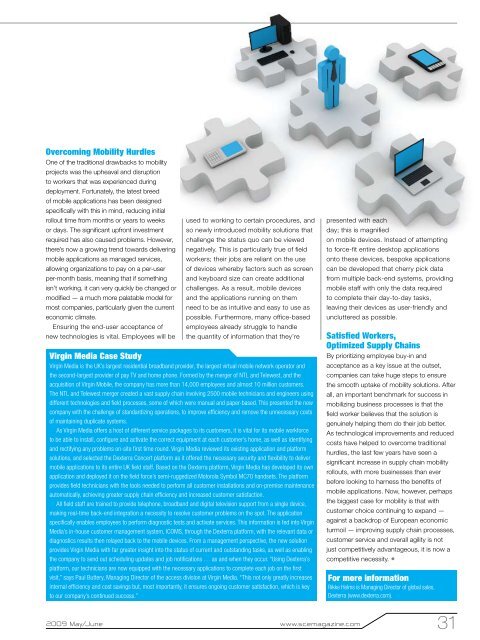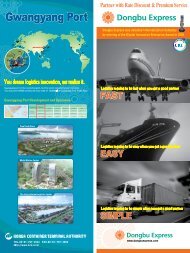w w w . s c e m a g a z i n e . c o m - Supply Chain Europe
w w w . s c e m a g a z i n e . c o m - Supply Chain Europe
w w w . s c e m a g a z i n e . c o m - Supply Chain Europe
Create successful ePaper yourself
Turn your PDF publications into a flip-book with our unique Google optimized e-Paper software.
Overcoming Mobility Hurdles<br />
One of the traditional drawbacks to mobility<br />
projects was the upheaval and disruption<br />
to workers that was experienced during<br />
deployment. Fortunately, the latest breed<br />
of mobile applications has been designed<br />
specifically with this in mind, reducing initial<br />
rollout time from months or years to weeks<br />
or days. The significant upfront investment<br />
required has also caused problems. However,<br />
there’s now a growing trend towards delivering<br />
mobile applications as managed services,<br />
allowing organizations to pay on a per-user<br />
per-month basis, meaning that if something<br />
isn’t working, it can very quickly be changed or<br />
modified — a much more palatable model for<br />
most companies, particularly given the current<br />
economic climate.<br />
Ensuring the end-user acceptance of<br />
new technologies is vital. Employees will be<br />
used to working to certain procedures, and<br />
so newly introduced mobility solutions that<br />
challenge the status quo can be viewed<br />
negatively. This is particularly true of field<br />
workers; their jobs are reliant on the use<br />
of devices whereby factors such as screen<br />
and keyboard size can create additional<br />
challenges. As a result, mobile devices<br />
and the applications running on them<br />
need to be as intuitive and easy to use as<br />
possible. Furthermore, many office-based<br />
employees already struggle to handle<br />
the quantity of information that they’re<br />
Virgin Media Case Study<br />
Virgin Media is the UK’s largest residential broadband provider, the largest virtual mobile network operator and<br />
the second-largest provider of pay TV and home phone. Formed by the merger of NTL and Telewest, and the<br />
acquisition of Virgin Mobile, the company has more than 14,000 employees and almost 10 million customers.<br />
The NTL and Telewest merger created a vast supply chain involving 2500 mobile technicians and engineers using<br />
different technologies and field processes, some of which were manual and paper-based. This presented the new<br />
company with the challenge of standardizing operations, to improve efficiency and remove the unnecessary costs<br />
of maintaining duplicate systems.<br />
As Virgin Media offers a host of different service packages to its customers, it is vital for its mobile workforce<br />
to be able to install, configure and activate the correct equipment at each customer’s home, as well as identifying<br />
and rectifying any problems on-site first time round. Virgin Media reviewed its existing application and platform<br />
solutions, and selected the Dexterra Concert platform as it offered the necessary security and flexibility to deliver<br />
mobile applications to its entire UK field staff. Based on the Dexterra platform, Virgin Media has developed its own<br />
application and deployed it on the field force’s semi-ruggedized Motorola Symbol MC70 handsets. The platform<br />
provides field technicians with the tools needed to perform all customer installations and on-premise maintenance<br />
automatically, achieving greater supply chain efficiency and increased customer satisfaction.<br />
All field staff are trained to provide telephone, broadband and digital television support from a single device,<br />
making real-time back-end integration a necessity to resolve customer problems on the spot. The application<br />
specifically enables employees to perform diagnostic tests and activate services. This information is fed into Virgin<br />
Media’s in-house customer management system, ICOMS, through the Dexterra platform, with the relevant data or<br />
diagnostics results then relayed back to the mobile devices. From a management perspective, the new solution<br />
provides Virgin Media with far greater insight into the status of current and outstanding tasks, as well as enabling<br />
the company to send out scheduling updates and job notifications … as and when they occur. “Using Dexterra’s<br />
platform, our technicians are now equipped with the necessary applications to complete each job on the first<br />
visit,” says Paul Buttery, Managing Director of the access division at Virgin Media. “This not only greatly increases<br />
internal efficiency and cost savings but, most importantly, it ensures ongoing customer satisfaction, which is key<br />
to our company’s continued success.”<br />
presented with each<br />
day; this is magnified<br />
on mobile devices. Instead of attempting<br />
to force-fit entire desktop applications<br />
onto these devices, bespoke applications<br />
can be developed that cherry pick data<br />
from multiple back-end systems, providing<br />
mobile staff with only the data required<br />
to complete their day-to-day tasks,<br />
leaving their devices as user-friendly and<br />
uncluttered as possible.<br />
Satisfied Workers,<br />
Optimized <strong>Supply</strong> <strong>Chain</strong>s<br />
By prioritizing employee buy-in and<br />
acceptance as a key issue at the outset,<br />
companies can take huge steps to ensure<br />
the smooth uptake of mobility solutions. After<br />
all, an important benchmark for success in<br />
mobilizing business processes is that the<br />
field worker believes that the solution is<br />
genuinely helping them do their job better.<br />
As technological improvements and reduced<br />
costs have helped to overcome traditional<br />
hurdles, the last few years have seen a<br />
significant increase in supply chain mobility<br />
rollouts, with more businesses than ever<br />
before looking to harness the benefits of<br />
mobile applications. Now, however, perhaps<br />
the biggest case for mobility is that with<br />
customer choice continuing to expand —<br />
against a backdrop of <strong>Europe</strong>an economic<br />
turmoil — improving supply chain processes,<br />
customer service and overall agility is not<br />
just competitively advantageous, it is now a<br />
competitive necessity. •<br />
For more information<br />
Rikke Helms is Managing Director of global sales,<br />
Dexterra (www.dexterra.com).<br />
2009 may/June www.scemagazine.com 31



